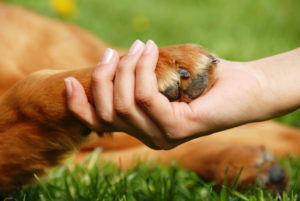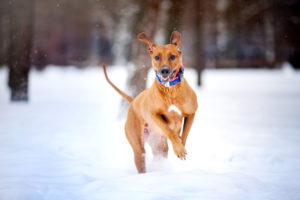Whether you are a new dog owner or a seasoned one, you need to make sure you are taking all the steps you can to keep your dog healthy all winter long. With cold winter temperatures, snow and ice accumulation, and the arrival of the holiday season come additional dog health hazards you need to be prepared for.
1. Protect Your Dog’s Paws From Salt and Chemical Deicers
Of course, you shouldn’t skip your dog’s daily walks just because there is a little snow on the ground. However, if you salt your home’s walkways to melt ice that accumulates on them or walk your dog on any other surface that is salted, realize that this salt poses a great hazard to your dog’s paw health.

Exposure to salt and other chemical deicers can actually cause chemical burns on your dog’s paws, so be sure to avoid walking your dog on sidewalks and walkways covered in salt.
If you simply cannot avoid this salt, then cover your dog’s paws with a special paw balm before every walk. This balm will form a protective layer between your dog’s paws any salt they encounter on the ground
2. Keep Walks Short When Temperatures Are Low To Avoid Hypothermia & Frostbite
The average low winter temperature in Wisconsin is a chilly 16 degrees F, although you likely know that temperatures can become much colder than this during long Wisconsin winters. You need to be aware of the fact that your dog can
develop frostbite or hypothermia if you walk them too long on a cold day.
In general, young, large dogs with thick hair fair the best in cold temperatures. On the contrary, small dogs with thin coats, older dogs, and dogs suffering from illnesses can develop hypothermia much more quickly.
If you just moved to Wisconsin from a state where it is warm year-round, also be aware that your dog will go through an adjustment period, just like you likely will, before they can tolerate the cold as well as a dog who is used to cold winter temperatures.
While you should skip long dog walks when it is 0 degrees F outdoors or colder, how well your dog will tolerate temperatures above this will depend highly on your dog. At temperatures below freezing, keep walks short — a small dog can typically tolerate about 15 minutes outdoors in cold temperatures while a large dog can withstand walks of about 30 minutes in length.
However, when walking your dog in cold temperatures, always keep an eye out for the signs of hypothermia. A dog suffering from hypothermia will first begin shivering and then become very lethargic. Additional signs of hypothermia in dogs include weakness, shallow breathing, muscle stiffness, and confusion. As hypothermia progresses to its advanced stages, your dog’s pupils can become dilated and they can ultimately enter a coma.
If your dog develops frostbite, they will display a gray or blue-toned discoloration of the skin, and your dog may experience pain when you touch the area.

3. Avoid These Dog Holiday Hazards
As winter approaches, the holidays come with it. Be aware of holiday hazards that can cause your dog to become ill or even endanger their life. While you may know that poinsettia plants are toxic to cats, many dog owners do not realize that these plants are also hazardous to a dog’s health if consumed. If you like to display mistletoe in your home during the holiday season, also realize that this plant is poisonous to dogs.
In addition, when preparing or eating your holiday dinner, be sure to not to feed your dog any raisins, currants, or grapes. These things can actually cause kidney failure in dogs or fat scraps left over after eating meat because the consumption of these scraps can actually lead to your dog developing pancreatitis.
As winter arrives, be sure to follow these three tips for avoiding dog winter health hazards. Reach out to the
Animal Medical Center of Appleton if you have more questions about winter dog care or want to schedule an appointment with one of our vets.



